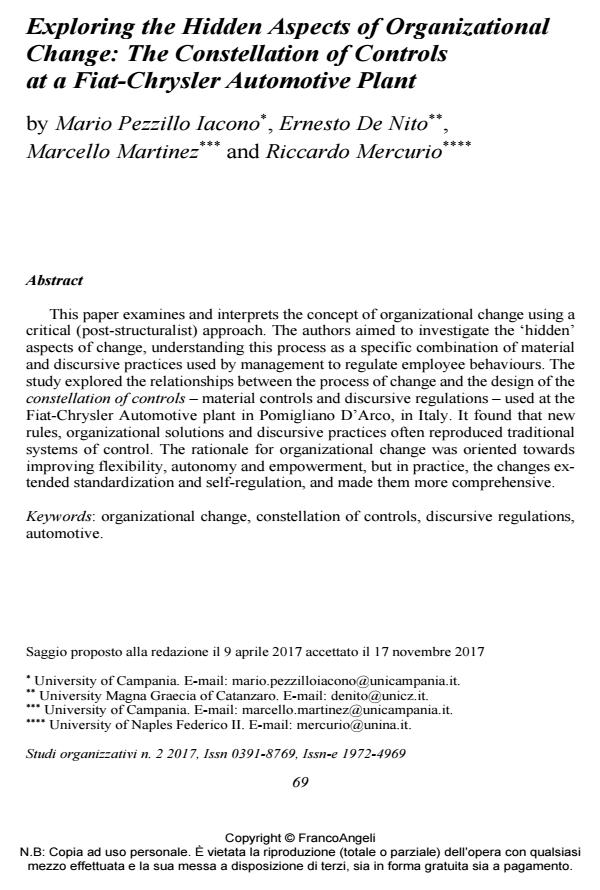Exploring the Hidden Aspects of Organizational Change: The Constellation of Controls at a Fiat-Chrysler Automotive Plant
Journal title STUDI ORGANIZZATIVI
Author/s Mario Pezzillo Iacono, Ernesto De Nito, Marcello Martinez, Riccardo Mercurio
Publishing Year 2018 Issue 2017/2
Language English Pages 21 P. 69-89 File size 214 KB
DOI 10.3280/SO2017-002004
DOI is like a bar code for intellectual property: to have more infomation
click here
Below, you can see the article first page
If you want to buy this article in PDF format, you can do it, following the instructions to buy download credits

FrancoAngeli is member of Publishers International Linking Association, Inc (PILA), a not-for-profit association which run the CrossRef service enabling links to and from online scholarly content.
This paper examines and interprets the concept of organizational change using a critical (post-structuralist) approach. The authors aimed to investigate the ‘hidden’ aspects of change, understanding this process as a specific combination of material and discursive practices used by management to regulate employee behaviours. The study explored the relationships between the process of change and the design of the constellation of controls - material controls and discursive regulations - used at the Fiat-Chrysler Automotive plant in Pomigliano D’Arco, in Italy. It found that new rules, organizational solutions and discursive practices often reproduced traditional systems of control. The rationale for organizational change was oriented towards improving flexibility, autonomy and empowerment, but in practice, the changes extended standardization and self-regulation, and made them more comprehensive.
Keywords: Organizational change, constellation of controls, discursive regulations, automotive.
- La Narrazione nelle Scienze Sociali: valore e attualità del contributo di Barbara Czarniawska Mario Pezzillo Iacono, in STUDI ORGANIZZATIVI 2/2019 pp.220
DOI: 10.3280/SO2018-002010 - Towards Digital and Sustainable Organisations Paolo Canonico, Ernesto De Nito, Vincenza Esposito, Marcello Martinez, Mario Pezzillo Iacono, pp.89 (ISBN:978-3-031-52879-8)
- Measuring organizational identity via LinkedIn: The role played by employees' tenure, type of employment contract and age Stefano Di Lauro, Aizhan Tursunbayeva, Gilda Antonelli, Marcello Martinez, in STUDI ORGANIZZATIVI 2/2019 pp.114
DOI: 10.3280/SO2018-002005 - Responsabilità sociale d'impresa 2.0 e sostenibilità digitale Lara Lazzeroni, (ISBN:979-12-215-0262-6)
Mario Pezzillo Iacono, Ernesto De Nito, Marcello Martinez, Riccardo Mercurio, Exploring the Hidden Aspects of Organizational Change: The Constellation of Controls at a Fiat-Chrysler Automotive Plant in "STUDI ORGANIZZATIVI " 2/2017, pp 69-89, DOI: 10.3280/SO2017-002004